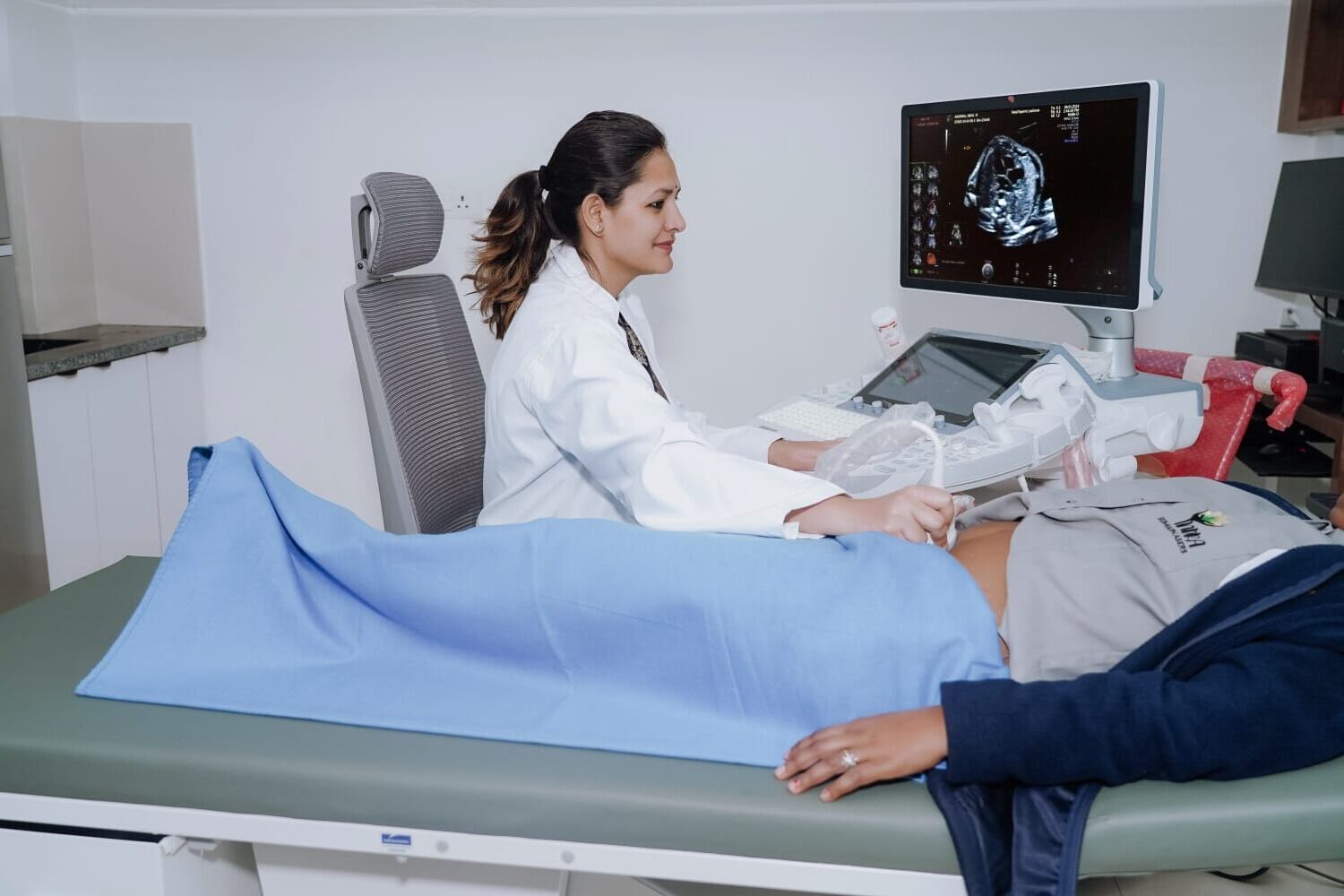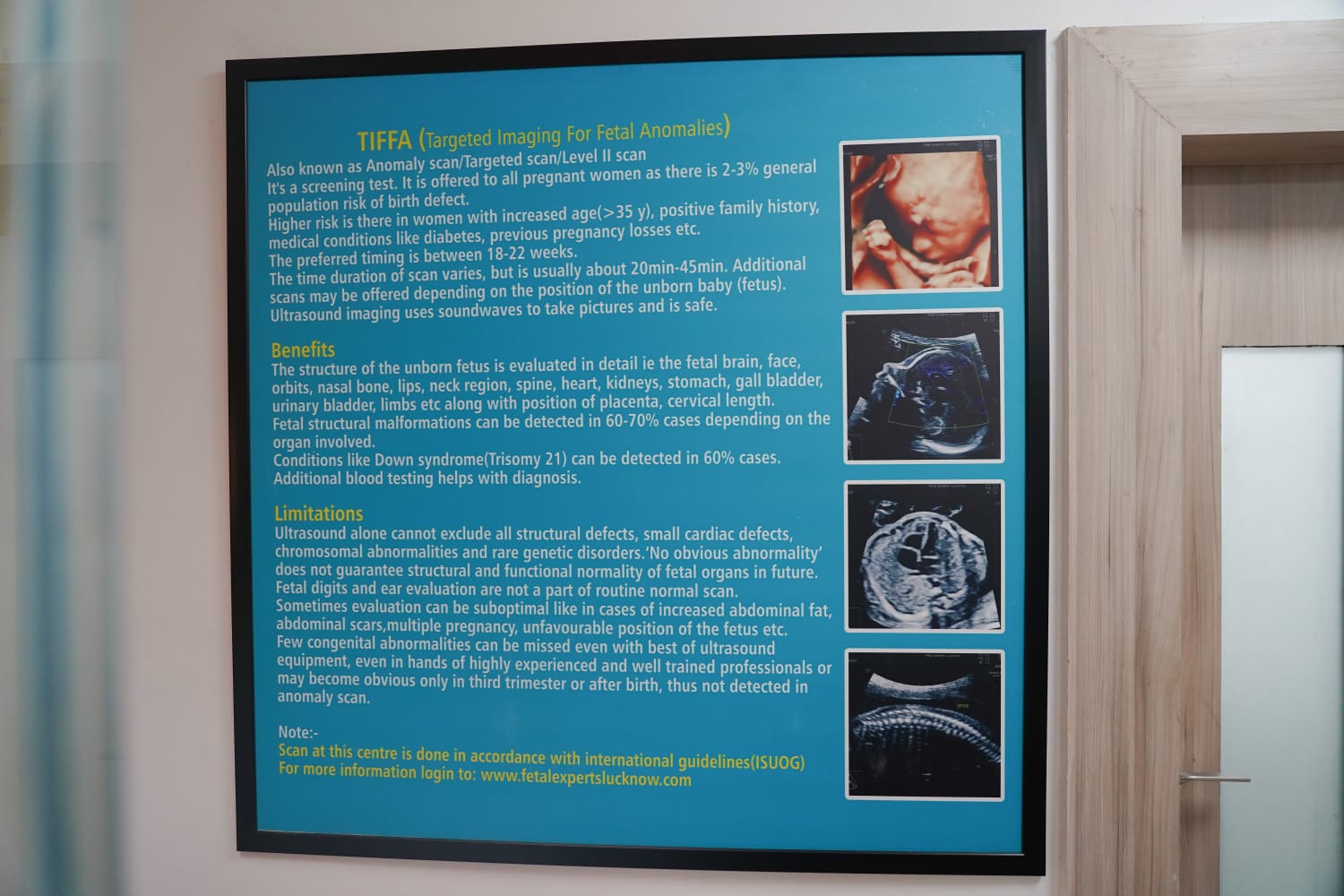What is an anomaly scan ?
Also known as targeted scan, TIFFA(Targeted imaging for fetal anomalies), Level II scan
It is offered to all pregnant women as there is 2-3% general population risk of birth defect.
This scan is a screening test used to check for physical abnormalities and to assess your baby for different conditions that may be detected before birth. We closely examine the major organs and structures of the baby to see if they have developed normally. Measurements of the head, abdomen and thigh bone are taken to confirm the baby is growing normally. It is possible to detect many abnormalities, but not all.
Ultrasound imaging uses soundwaves to take pictures. It is radiation free and is not harmful to you or your unborn baby.
The preferred timing for anomaly scan is 18-22 weeks of pregnancy.
What is to be done prior to exam?
1. Kindly take appointment at least one day prior to exam.
2. Please come with a comfortably full bladder.
3. It is helpful to hold off on using any creams or lotions on your belly on the morning of your test. If you have had any previous tests, such as a past ultrasound, bring any medical records that you have.
4. Kindly turn off your phone/keep it in silent mode before entering the ultrasound room and throughout the examination.
What will happen during the examination?
The scan will be performed in dimly lit room and you would be asked to lie on a flat couch. Clear(perhaps cold) ultrasound gel will then be applied and the ultrasound specialist will commence the exam. To get optimum views of your baby, slight pressure may have to be applied.
The ultrasound specialist will perform a series of measurements to check the growth of the baby.

The structure of fetus is evaluated in great detail ie the fetal brain, face, orbits, nasal bone, lips, neck region, spine, heart, kidneys, stomach, gall bladder, urinary bladder, limbs etc along with position of placenta, cervical length.*
The time duration varies, but is usually between 30 – 45 minutes.
Occasionally the picture quality is poor, this may be due to the position of the baby, your bladder not being full enough or your size. Sometime the baby’s position makes it difficult to complete all the checks in one go. In these situations, you may need to have a repeat scan on the same day, or we may ask you to come back another day.
Sometimes due to a number of factors an abdominal scan may not be sufficient and you will be offered a transvaginal scan. This would involve a long thin probe with a cover being inserted into the vagina for a clearer view. This does not hurt and will not harm the baby.
Sometimes the checks will still not be complete. If this happens the report will record information about the structures that were not adequately seen on either scan.
Benefits
Most babies are normal and healthy and most parents find the experience enjoyable and informative. However, if a problem is suspected, you would be informed about the same.
The purpose of the 20-week screening scan is to identify specified conditions that:
- Benefit from treatment before or after birth
- Need treatment in a specialist setting after birth to improve health outcomes.
- Could mean the baby may die shortly after birth.
- Lead to a discussion about the options of continuing or terminating the pregnancy

Fetal structural malformations can be detected in 60-70% cases depending on the organ involved. Conditions like Down syndrome(Trisomy 21) can be detected in 60% cases. Additional blood testing helps with diagnosis.
*Scan at Fetal Experts Lucknow is done in accordance with international guidelines(ISUOG).
Limitations
Some structural defects such as Spina Bifida, hydrocephalus (excess water on the brain), limb deformities, can usually be seen. Other abnormalities are harder to detect, for example, less than half of all heart defects will be seen. It is important to remember that all these problems are rare. It is very important to understand that Ultrasound scanning does not reveal every abnormality and there are many conditions that cannot be diagnosed in this way.
Ultrasound alone cannot exclude all structural defects, chromosomal abnormalities and rare genetic disorders.
No obvious abnormality does not guarantee structural and functional normality of fetal organs in future.
Fetal digits and ear evaluation are not a part of routine normal scan.
Few congenital abnormalities can be missed even with best of ultrasound equipment, even in hands of highly experienced and well trained professionals or may become obvious only in third trimester or after birth, thus not detected in anomaly scan.
What happens after the examination?
You would usually receive the printed report on the same day. You can take appointment for any subsequent scans which would then be arranged at the correct time.
